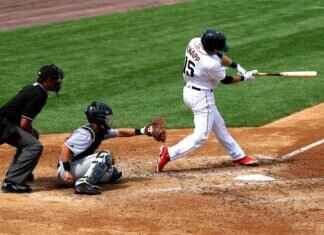A high school basketball coach in New York faced swift consequences after a video captured him pulling a player’s ponytail following a tough loss in the girls basketball state championship game. Jim Zullo, the former coach of the girls team at Northville Central, was fired by the school in the Adirondacks soon after the incident that occurred after the team’s defeat to La Fargeville in the Class D state final.
In a statement released on Sunday, Zullo expressed deep regret for his actions, acknowledging that his behavior was inexcusable. The apology, first obtained by Albany-area television station WNYT, was directed at the player, Hailey Monroe, her family, the team, the school, and the community. Zullo emphasized that as a coach, it is never acceptable to lay hands on a player and expressed a wish to undo his actions.
The hair-pulling incident took place as the teams were preparing for the postgame ceremony at Hudson Valley Community College in Troy, which involved the customary handshakes and award presentation. Zullo, an experienced coach at 81 years old, had led the Northville team to the state final for two consecutive seasons, showcasing his dedication and success in the sport. Prior to coaching girls at Northville, he had a long history of coaching boys, including winning a state championship in 1987.
Zullo’s decision to coach girls basketball was influenced by his late wife’s encouragement, who tragically passed away during the 2023-24 season. The difficult circumstances surrounding his personal life added a layer of complexity to his coaching tenure, making his apology and reflection on the incident particularly poignant. Despite the controversy, Zullo expressed gratitude for the opportunity to work with the team and pride in their achievements, highlighting the resilience and potential of the young women he had coached.
Following the incident, the Northville school district issued a statement on Friday night, confirming Zullo’s dismissal and emphasizing the seriousness with which they were addressing the matter. The swift response from the school district underscored the zero-tolerance policy for any form of physical contact between coaches and players, ensuring a safe and respectful environment for all participants.
Expert Insights on Coach-Player Dynamics
Experts in sports psychology and coaching dynamics often stress the importance of maintaining professionalism and respect in the coach-player relationship. Dr. Emily Carter, a sports psychologist, explains, “Coaches serve as mentors and role models for young athletes, and any form of physical aggression can have lasting negative effects on the players’ psyche and performance.”
Ensuring that coaches receive adequate training on appropriate behavior and conflict resolution strategies is crucial in preventing similar incidents in the future. By fostering a culture of mutual respect and open communication, coaches can effectively guide and inspire their players to achieve their full potential on and off the court.
Lessons Learned and Moving Forward
The incident involving Coach Zullo serves as a sobering reminder of the responsibilities and boundaries that coaches must uphold in their interactions with players. While mistakes can happen in the heat of the moment, it is essential for coaches to reflect on their actions, take accountability, and learn from the experience to prevent similar occurrences in the future.
By promoting a culture of empathy, understanding, and accountability, sports organizations can create a safe and positive environment where athletes can thrive and develop both athletically and personally. Coaches play a pivotal role in shaping the character and values of their players, and it is crucial that they lead by example and demonstrate the highest standards of behavior and sportsmanship.
As Coach Zullo navigates the aftermath of the incident and seeks to make amends, his journey serves as a powerful lesson in humility, growth, and resilience. By acknowledging his mistake, offering a sincere apology, and committing to personal and professional development, he paves the way for healing, reconciliation, and positive change within the sports community. Through introspection and dialogue, coaches and players alike can forge stronger bonds, cultivate mutual respect, and create a culture of inclusivity and integrity in sports.
































